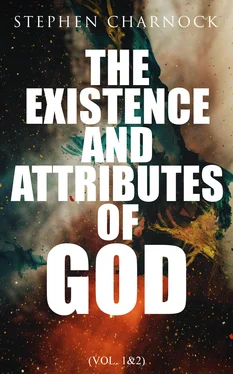Stephen Charnock - The Existence and Attributes of God (Vol. 1&2)
Здесь есть возможность читать онлайн «Stephen Charnock - The Existence and Attributes of God (Vol. 1&2)» — ознакомительный отрывок электронной книги совершенно бесплатно, а после прочтения отрывка купить полную версию. В некоторых случаях можно слушать аудио, скачать через торрент в формате fb2 и присутствует краткое содержание. Жанр: unrecognised, на английском языке. Описание произведения, (предисловие) а так же отзывы посетителей доступны на портале библиотеки ЛибКат.
- Название:The Existence and Attributes of God (Vol. 1&2)
- Автор:
- Жанр:
- Год:неизвестен
- ISBN:нет данных
- Рейтинг книги:3 / 5. Голосов: 1
-
Избранное:Добавить в избранное
- Отзывы:
-
Ваша оценка:
- 60
- 1
- 2
- 3
- 4
- 5
The Existence and Attributes of God (Vol. 1&2): краткое содержание, описание и аннотация
Предлагаем к чтению аннотацию, описание, краткое содержание или предисловие (зависит от того, что написал сам автор книги «The Existence and Attributes of God (Vol. 1&2)»). Если вы не нашли необходимую информацию о книге — напишите в комментариях, мы постараемся отыскать её.
The Existence and Attributes of God (Vol. 1&2) — читать онлайн ознакомительный отрывок
Ниже представлен текст книги, разбитый по страницам. Система сохранения места последней прочитанной страницы, позволяет с удобством читать онлайн бесплатно книгу «The Existence and Attributes of God (Vol. 1&2)», без необходимости каждый раз заново искать на чём Вы остановились. Поставьте закладку, и сможете в любой момент перейти на страницу, на которой закончили чтение.
Интервал:
Закладка:
The fool , a term in scripture signifying a wicked man, used also by the heathen philosophers to signify a vicious person, נבל as coming from נבל signifies the extinction of life in men, animals, and plants; so the word נבל is taken, a plant that hath lost all that juice that made it lovely and useful. 6So a fool is one that hath lost his wisdom, and right notion of God and divine things which were communicated to man by creation; one dead in sin, yet one not so much void of rational faculties as of grace in those faculties, not one that wants reason, but abuses his reason. In Scripture the word signifies foolish. 7
Said in his heart ; that is, he thinks, or he doubts, or he wishes. The thoughts of the heart are in the nature of words to God, though not to men. It is used in the like case of the atheistical person, (Ps. x. 11, 13), “He hath said in his heart, God hath forgotten; he hath said in his heart, Thou wilt not require it.” He doth not form a syllogism, as Calvin speaks, that there is no God: he dares not openly publish it, though he dares secretly think it. He cannot raze out the thoughts of a Deity, though he endeavors to blot those characters of God in his soul. He hath some doubts whether there be a God or no: he wishes there were not any, and sometimes hopes there is none at all. He could not so ascertain himself by convincing arguments to produce to the world, but he tampered with his own heart to bring it to that persuasion, and smothered in himself those notices of a Deity; which is so plain against the light of nature, that such a man may well be called a fool for it.
There is no God 8לית שולטנא non potestas Domini , Chaldæ. It is not Jehovah, which name signifies the essence of God, as the prime and supreme being; but Eloahia, which name signifies the providence of God, God as a rector and judge. Not that he denies the existence of a Supreme Being, that created the world, but his regarding the creatures, his government of the world, and consequently his reward of the righteous or punishments of the wicked.
There is a threefold denial of God, 91. Quoad existentiam ; this is absolute atheism. 2. Quoad Providentiam , or his inspection into, or care of the things of the world, bounding him in the heavens. 3. Quoad naturam , in regard of one or other of the perfections due to his nature.
Of the denial of the providence of God most understand this, not excluding the absolute atheist, as Diagoras is reported to be, nor the skeptical atheist, as Protagoras, who doubted whether there were a God. 10Those that deny the providence of God, do in effect deny the being of God; for they strip him of that wisdom, goodness, tenderness, mercy, justice, righteousness, which are the glory of the Deity. And that principle, of a greedy desire to be uncontrolled in their lusts, which induceth men to a denial of Providence, that thereby they might stifle those seeds of fear which infect and embitter their sinful pleasures, may as well lead them to deny that there is any such being as a God. That at one blow, their fears may be dashed all in pieces and dissolved by the removal of the foundation: as men who desire liberty to commit works of darkness, would not have the lights in the house dimmed, but extinguished. What men say against Providence, because they would have no check in their lusts, they may say in their hearts against the existence of God upon the same account; little difference between the dissenting from the one and disowning the other.
They are corrupt, they have done abominable works, there is none that doeth good. He speaks of the atheist in the singular, “the fool;” of the corruption issuing in the life in the plural; intimating that though some few may choke in their hearts the sentiments of God and his providence, and positively deny them, yet there is something of a secret atheism in all, which is the fountain of the evil practices in their lives, not an utter disowning of the being of a God, but a denial or doubting of some of the rights of his nature. When men deny the God of purity, they must needs be polluted in soul and body, and grow brutish in their actions. When the sense of religion is shaken off, all kinds of wickedness is eagerly rushed into, whereby they become as loathsome to God as putrefied carcases are to men. 11Not one or two evil actions is the product of such a principle, but the whole scene of a man’s life is corrupted and becomes execrable.
No man is exempted from some spice of atheism by the depravation of his nature, which the psalmist intimates, “there is none that doeth good:” though there are indelible convictions of the being of a God, that they cannot absolutely deny it; yet there are some atheistical bubblings in the hearts of men, which evidence themselves in their actions. As the apostle, (Tit. i. 16), “They profess that they know God, but in works they deny him.” Evil works are a dust stirred up by an atheistical breath. He that habituates himself in some sordid lust, can scarcely be said seriously and firmly to believe that there is a God in being; and the apostle doth not say that they know God, but they profess to know him: true knowledge and profession of knowledge are distinct. It intimates also to us, the unreasonableness of atheism in the consequence, when men shut their eyes against the beams of so clear a sun, God revengeth himself upon them for their impiety, by leaving them to their own wills, lets them fall into the deepest sink and dregs of iniquity; and since they doubt of him in their hearts, suffers them above others to deny him in their works, this the apostle discourseth at large. 12The text then is a description of man’s corruption.
1. Of his mind. The fool hath said in his heart. No better title than that of a fool is afforded to the atheist.
2. Of the other faculties, 1. In sins of commission, expressed by the loathsomeness ( corrupt , abominable ), 2. In sins of omission ( there is none that doeth good ) he lays down the corruption of the mind as the cause, the corruption of the other faculties as the effect.
I. It is a great folly to deny or doubt of the existence or being of God: or, an atheist is a great fool.
II. Practical atheism is natural to man in his corrupt state. It is against nature as constituted by God, but natural, as nature is depraved by man: the absolute disowning of the being of a God is not natural to men, but the contrary is natural; but an inconsideration of God, or misrepresentation of his nature, is natural to man as corrupt.
III. A secret atheism, or a partial atheism, is the spring of all the wicked practices in the world: the disorders of the life spring from the ill dispositions of the heart.
For the first, every atheist is a grand fool. If he were not a fool, he would not imagine a thing so contrary to the stream of the universal reason of the world, contrary to the rational dictates of his own soul, and contrary to the testimony of every creature, and link in the chain of creation: if he were not a fool, he would not strip himself of humanity, and degrade himself lower than the most despicable brute. It is a folly; for though God be so inaccessible that we cannot know him perfectly, yet he is so much in the light, that we cannot be totally ignorant of him; as he cannot be comprehended in his essence, he cannot be unknown in his existence; it is as easy by reason to understand that he is, as it is difficult to know what he is. The demonstrations reason furnisheth us with for the existence of God, will be evidences of the atheist’s folly. One would think there were little need of spending time in evidencing this truth, since in the principle of it, it seems to be so universally owned, and at the first proposal and demand, gains the assent of most men.
Читать дальшеИнтервал:
Закладка:
Похожие книги на «The Existence and Attributes of God (Vol. 1&2)»
Представляем Вашему вниманию похожие книги на «The Existence and Attributes of God (Vol. 1&2)» списком для выбора. Мы отобрали схожую по названию и смыслу литературу в надежде предоставить читателям больше вариантов отыскать новые, интересные, ещё непрочитанные произведения.
Обсуждение, отзывы о книге «The Existence and Attributes of God (Vol. 1&2)» и просто собственные мнения читателей. Оставьте ваши комментарии, напишите, что Вы думаете о произведении, его смысле или главных героях. Укажите что конкретно понравилось, а что нет, и почему Вы так считаете.












